- Home
- Lauren Tarshis
I Survived the Children's Blizzard, 1888
I Survived the Children's Blizzard, 1888 Read online
For David
CONTENTS
TITLE PAGE
DEDICATION
CHAPTER 1
CHAPTER 2
CHAPTER 3
CHAPTER 4
CHAPTER 5
CHAPTER 6
CHAPTER 7
CHAPTER 8
CHAPTER 9
CHAPTER 10
CHAPTER 11
CHAPTER 12
CHAPTER 13
CHAPTER 14
CHAPTER 15
CHAPTER 16
CHAPTER 17
CHAPTER 18
CHAPTER 19
CHAPTER 20
CHAPTER 21
MY PRAIRIE JOURNEY
QUESTIONS AND ANSWERS ABOUT THE CHILDREN’S BLIZZARD AND LIFE IN 1888
FOR FURTHER READING AND LEARNING
SELECTED BIBLIOGRAPHY
ACKNOWLEDGMENTS
ABOUT THE AUTHOR
COPYRIGHT
A deadly blizzard raged across the prairie, and eleven-year-old John Hale was trapped in a frozen nightmare. The wind screamed in his ears as he staggered through the blinding snow. His whole body was numb.
The monster storm had come out of nowhere, a massive black cloud moving faster than a train. The temperature plunged. The wind howled. And then,
Roooaar!
The sky exploded like a bomb, blasting snow and ice through the air.
Ground-up ice raked John’s eyes like tiny claws. The furious wind pounded him, tore at him, spun him around. He felt like he was locked in a cage with a furious beast trying to rip him to pieces.
And then a screaming gust picked John up and slammed him down. He tried to rise to his feet, but the wind was too strong. Snow was piling on top of him, burying him in an icy grave.
John felt his flesh freezing on his bones. His body’s warmth was seeping out of him, like blood leaking from an open wound.
John had never wanted to move west, to this wide-open prairie. He was a city kid, not a tough pioneer. And now the maniac wind was hissing in his ears, taunting him.
You’re weak!
You’ll never make it!
You’re doomed!
That terrifying, evil wind was the last sound John heard as he was buried alive.
John’s little sister, Franny, had disappeared.
She and John were on their way to their schoolhouse. They were halfway through the three-mile walk from their farm. They were following an old wagon trail that cut through the tall, golden grass.
Franny, who was five, had been skipping up ahead. John had been watching her blond braids flap up and down, like the wings of a happy yellow bird. Somehow he’d lost sight of her.
John sped up, looking all around. It was hard to see through the grass, which rose up so high it tickled his neck. A unicorn could be prancing by, and John wouldn’t notice.
“Franny!” he shouted. “Where are you?”
Whoosh, said the wind. Swish, said the grass.
But no sign of Franny.
John sighed. She must be playing hide-and-seek, her favorite game. When Franny found a good spot, she’d sit there forever.
She was going to make them late. It was hard enough for John, going to a school where he had no friends. But his teacher, Miss Ruell, was mean.
He pictured her now, her hair stretched back in a bun, her eyes glaring through her little round glasses. She was young, and barely five feet tall. But she ruled over the schoolhouse like a Civil War general. John had never once seen her smile. When kids were late, Miss Ruell made them stay in for recess and memorize some boring poem.
Torture!
“Franny!” John shouted.
He stood on his tiptoes, peering into the distance. All he could see, in any direction, was wide-open prairie. It seemed to stretch out forever, an ocean made of grass.
He still couldn’t get used to it, all this empty land.
John and Franny and their parents had moved here to Dakota about a year ago, from Chicago. It wasn’t John’s idea; he’d been happy living in the city. But Ma and Pa were fed up with their dark little apartment, their cursing neighbors, and the noise and stink that rose up from the street.
For years Ma and Pa had been talking about moving out west and buying a farm. But John always figured that was just their crazy dream, like John wishing he could be a pitcher for the Chicago White Stockings, his favorite baseball team.
Pa didn’t make much money, working at a cabinet shop. How could they ever afford to buy land for a farm?
Then Ma and Pa heard they could get land in a place called Dakota. It was thousands of miles of open space, west of Minnesota. Dakota wasn’t a state, but it would be soon, folks said.
And the government wanted farmers to come. They were even giving away big plots of land — for free! All you had to do was build a farm and stay for five years. Then the land was yours forever.
For Ma and Pa, it was a dream come true.
“We’re heading west!” Pa boomed.
“We’ll be pioneers,” Ma said.
John hoped the West would be like the places in his favorite adventure stories, with rivers filled with gold nuggets and brave sheriffs chasing after famous bank robbers like Billy the Kid.
Ma and Pa sold practically everything they owned. They traveled west by train — it took seven days to reach the edge of Dakota Territory. Then they bought a rickety wagon and an ox to pull it. John named the ox Shadow, after his favorite White Stockings pitcher, Shadow Pyle.
It was a two-day ride to the little town of Prairie Creek. If you could call it a town. Only about twenty families lived there, on little farms scattered across the prairie. The main street was a dusty strip of dirt with a general store on one side and a hardware store and tiny hotel on the other. John’s family settled on a 160-acre piece of land about two miles outside of town.
There were no rivers of gold, no brave sheriffs. There wasn’t even a bank for a guy like Billy the Kid to rob. There was only empty space — and endless work.
John and Pa were sometimes out in the fields from dawn until dark. Ma hardly ever stopped scrubbing and cooking and sweeping. Franny’s scrawny little arms had sprouted muscles from hauling buckets of water from the well.
And the weather! The roasting summer sun. The thunderstorms that blackened the skies. Winter days so cold your spit froze before it hit the ground. Blizzards that came out of nowhere. Last winter the snow piled up almost to their rooftop. Pa had to dig a tunnel to get from the house to the barn.
But for John, the worst part was the emptiness. He got a lonely feeling when he looked out over the prairie, an ache inside him. It felt like a cold wind blowing right through his chest.
John didn’t belong here. He felt stranded in the middle of nowhere.
And now Miss Ruell was going to punish him for being late.
“Franny!”
But wait. What if Franny wasn’t playing a game? She could have wandered too far into the grass and gotten lost. Last year a little boy from town disappeared. One minute he’d been chasing jackrabbits behind his family’s house. The next minute he’d vanished.
John and Pa joined the big search, but the poor kid was never found. It was like the prairie had opened its grassy jaws and swallowed him whole.
John cupped his hands around his mouth and yelled at the top of his lungs.
“Franny!”
The grass swished. The wind moaned. A flock of geese honked across the bright blue sky.
But no sign of Franny.
John was at the edge of panic, when a giggle rose from the grass just a few yards ahead.
Franny’s freckled face popped up.
She grinned
at him. “Boo!”
“Franny!”
“Tricked you!” she said.
“You didn’t trick me,” John lied. “I knew exactly where you were hiding.”
“How did you know?” Franny asked with a frown.
“I could smell you,” John said, wrinkling his nose. “You stink worse than Princess.”
Princess was their cow. Franny had picked her name.
Actually, Franny smelled a little like apples and Ma’s soap. But John needed to get even with her for scaring him.
Franny’s smile fell away. Her eyes started to tear up.
“I do not stink!” she said.
“All right,” John said. He hated to see Franny sad. “But don’t do that again. I thought I lost you, Fran. You scared me.”
Franny burst out laughing. “That’s a funny joke, Johnny,” she said. “I know you’re never scared.”
John’s heart lifted a little. It was good having a little sister who thought he was brave.
They rushed the last mile to the schoolhouse, which was about a quarter mile past Main Street. It was just a small, unpainted building, more like an overgrown dollhouse than a school. The school was barely big enough to fit all fifteen students. The big and little kids squeezed together in the one room. Miss Ruell had to figure out how to teach all of them.
Luckily, John and Franny weren’t late.
The schoolhouse door was still closed. Kids were milling around outside, waiting for the bell. Franny went to join a jump rope game. John looked around, wishing he had someone to talk to. Back in Chicago, he had more friends than he could count. Before school he and his pals would shoot marbles or bug the girls they liked.
But here, there were only three boys his age: Rex, Peter, and Sven. They’d been friendly to John last fall, when he was brand-new. But John always felt uneasy around them, afraid he would say something wrong and make a fool of himself. So he avoided them.
Now they mostly ignored John — or maybe it was John who ignored them. He wasn’t sure. But what did it matter? He’d missed his chance. And anyway, they probably knew John didn’t belong here. He had nothing in common with those tough pioneer boys.
Peter and Sven were standing nearby, rubbing the sleep from their eyes. But then Rex came sprinting toward them, and Peter and Sven perked right up. Rex wasn’t funny like Peter. And he didn’t have big muscles like Sven. He was quiet, and serious. But Rex was their leader, without a doubt. His family had been in Dakota longer than anyone.
Rex skidded to a stop, huffing and puffing.
“I found him!” Rex exclaimed, wiping the sweat from his forehead.
“Found who?” asked Peter.
“King Rattler!” Rex burst out.
The boys gasped. John’s ears pricked up.
King Rattler was a huge rattlesnake that all the kids talked about. There were rattlesnakes everywhere in Dakota — stretching their gold-and-brown bodies out on rocks, slithering through the tall grass, curling up in haylofts. Of all the sounds of the prairie, nothing chilled John’s blood more than the shshshshsk shshshshsk shshshshshk of a rattler shaking its tail.
Get away, get away, it was saying. Get away or I’ll kill you!
And King Rattler wasn’t just any rattlesnake.
He was the biggest and most vicious snake there was, a killer that had been terrorizing people for years.
John had never seen him, but he’d heard the guys telling stories. Most snakes bit only if you stepped on them by accident. King Rattler would chase you down, right to your door. He’d bite your horse and then leap up and sink his fangs into your neck.
Or so the guys said.
“I saw him at the creek,” Rex went on, his voice rising. “I followed him! I found his den. I saw where he lives!”
“You found King Rattler’s den?” Peter gasped.
This was big news. Folks had been searching for years, John had heard.
“There’s a hole, a big, nasty hole, right under a rock,” Rex said. “I saw him go in. I saw it with my own eyes!”
John shuddered as he imagined the snake. The glistening fangs. The pink needle tongue. The deathly yellow eyes.
“So now,” Rex said, his eyes narrow and fierce. “We can kill King Rattler!”
“We’ll be famous!” Peter hooted.
Sven grinned.
Rex looked over and saw that John was listening in. John flicked his eyes down. Too late, though. He’d been caught spying.
Now Peter and Sven were looking at him, too. John started to get up to move away.
But Rex took a step toward him.
“Wanna come?” he asked.
John looked up in surprise.
“Come where?” he stammered.
“With us,” Rex said. “To kill King Rattler.”
John blinked.
They wanted him to help kill a monster rattlesnake? That was the dumbest idea John had ever heard!
He opened his mouth to say no, thanks.
But the guys were looking at him hopefully, like they really did want him to come along. It had been so long since any kids had looked at him that way.
Almost without thinking, John leaned forward.
“Sure I would,” he said.
Their morning chores were done. John, Franny, Ma, and Pa were back from church. Now they were sitting at the table for Ma’s special Sunday meal — squirrel stew.
Sundays were the best. John didn’t have to go school and usually the whole family took the day off from working. John would play cards with Franny, or go out hunting with Pa. Some days, he’d spend a whole hour just sitting around and doing nothing, like a millionaire.
But today was the day he was meeting the guys at the creek to kill King Rattler. Of course, he hadn’t told his parents the true plan for the afternoon. He’d said he was going fishing with his new friends.
“Good stew,” Pa said as he sopped up the sauce with a hunk of fresh bread.
It did smell delicious. But John’s stomach was twisted so tight he couldn’t take a bite.
“I’m glad you like it,” Ma said, flashing a smile at Pa. “I’ll tell the cook.”
“Ma!” Franny giggled. “You’re the cook!”
Ma’s big brown eyes widened in pretend surprise. “I thought I was the queen!”
“Of course you’re the queen!” Pa boomed. “And this is your castle.”
Ma smiled, because their house was the complete opposite of a castle. It was just one small room, made of dirt.
Pa had built it for them when they got here last fall. They wanted to live in a wooden house, but no trees grew in this part of Dakota. Pa couldn’t just chop down a big oak and start sawing and hammering. And they couldn’t afford to buy enough wood for a whole house.
So like most Dakota settlers, they built a house made of sod — dirt and grass peeled right up from the ground. Pa plowed up the sod in long strips, and then John helped him chop the strips into big blocks. They piled the blocks up to make the walls of their house. They had just enough money to buy some wood for the door and the roof.
The house — a “soddy” — was one small room, barely big enough for their beds, the table and chairs, and the big black stove that cooked their food and kept them warm in the winter. When it rained hard, muddy water dripped down from the ceiling. The dirt floor turned into a mud puddle. Worms and spiders and mice popped out of the walls.
But most of the time the soddy was surprisingly cozy. The thick dirt walls helped keep the heat in during the winter. On oven-hot summer days the soddy stayed cool. And when they were all sitting together like they were now, with one of Ma’s delicious meals on the table, the little dirt house felt like home.
Ma cleared away the stew bowls and brought out a berry pie. The sweet and buttery smell rose up. But John was too queasy to even have a taste.
He kept imagining how it would feel to have King Rattler’s fangs stab into his flesh. The bite wasn’t the painful part, he’d heard. It was what the venom did to you
r body — how it poisoned your blood and rotted your flesh and then finally stopped your heart.
And there was no cure for a rattlesnake bite. If you were lucky, the doctor could chop off the part of your body the snake bit. But most people died. Last year a girl from his school was bitten while she was running barefoot in the grass. Lucky for her, the snake was just a baby. The little girl only lost a toe.
John shuddered. What was he thinking? He wasn’t tough like Rex and the guys. He was just a city kid.
“John,” Ma said, putting down her spoon. “Are you feeling all right?”
“You’re looking a little green, son,” Pa added.
“Oh, no! Johnny’s turning into a frog!” Franny said in horror.
Ma had been reading Franny a fairy tale about a witch who turned a prince into a frog.
“That’s just a saying, Fran,” Ma said. “When a person looks green, it means they feel sick to their stomach.”
“Oh, no!” Franny exclaimed. “Johnny’s going to throw up!”
“I’m fine,” John fibbed, sitting up straighter and digging his fork into his pie.
If he wasn’t careful, Ma was going to make him gulp down one of her disgusting medicines. The closest doctor was twenty miles from here — a two-day journey in their rickety wagon. So Ma had a shelf of home remedies — potions and oils and syrups she bought at the general store. Her favorite for upset stomachs was Brown’s Bitters. It tasted like a skunk had died in the bottle.
“I feel all right,” John said, forcing down a bite of his pie.
“Should be a good day for fishing,” Pa said.
“Catch us a big one!” Ma said, rubbing her hands together. “I’ll cook it for supper.”
John pictured a big fat rattlesnake cooking in Ma’s stewpot.
“Yum!” Franny chirped.
John stood up. If he didn’t leave now, he’d puke for sure.
John grabbed his cap and said good-bye.
The meeting place was a pond near the creek. John got there first, so he sat at the water’s edge to wait. The air was cool, but the sun warmed his back. The water was like a mirror, and it matched the bright blue sky. As usual, the only sound was the moaning wind and the whooshing of the grass.

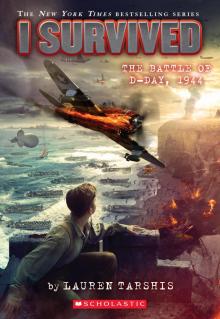 I Survived the Battle of D-Day, 1944 (I Survived #18)
I Survived the Battle of D-Day, 1944 (I Survived #18)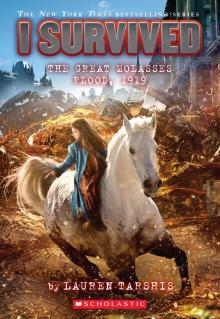 I Survived the Great Molasses Flood, 1919
I Survived the Great Molasses Flood, 1919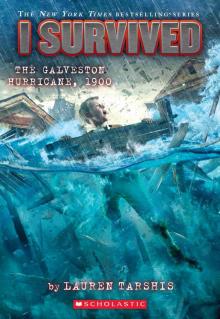 I Survived the Galveston Hurricane, 1900
I Survived the Galveston Hurricane, 1900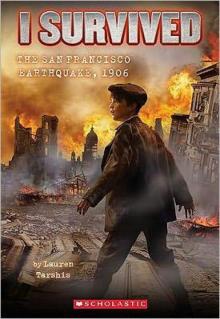 I Survived the San Francisco Earthquake, 1906
I Survived the San Francisco Earthquake, 1906 I Survived #4: I Survived the Bombing of Pearl Harbor, 1941
I Survived #4: I Survived the Bombing of Pearl Harbor, 1941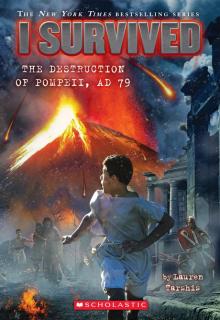 I Survived the Destruction of Pompeii, AD 79
I Survived the Destruction of Pompeii, AD 79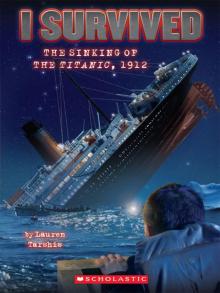 I Survived #1: I Survived the Sinking of the Titanic, 1912
I Survived #1: I Survived the Sinking of the Titanic, 1912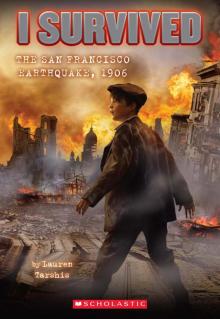 I Survived #5: I Survived the San Francisco Earthquake, 1906
I Survived #5: I Survived the San Francisco Earthquake, 1906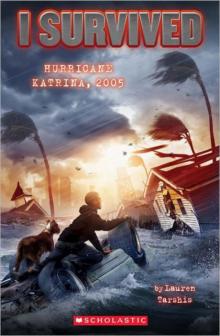 I Survived Hurricane Katrina, 2005
I Survived Hurricane Katrina, 2005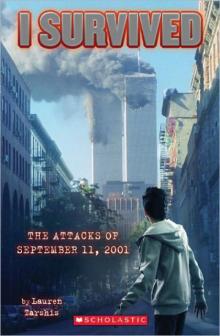 I Survived the Attacks of September 11th, 2001
I Survived the Attacks of September 11th, 2001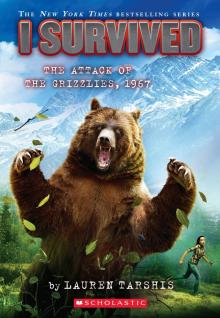 I Survived the Attack of the Grizzlies, 1967
I Survived the Attack of the Grizzlies, 1967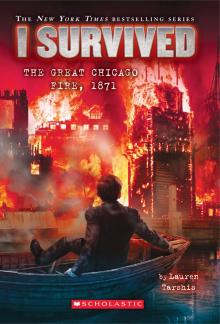 I Survived the Great Chicago Fire, 1871
I Survived the Great Chicago Fire, 1871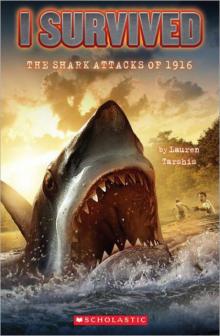 I Survived the Shark Attacks of 1916
I Survived the Shark Attacks of 1916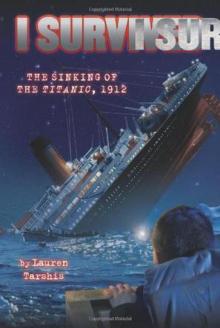 I Survived the Sinking of the Titanic, 1912
I Survived the Sinking of the Titanic, 1912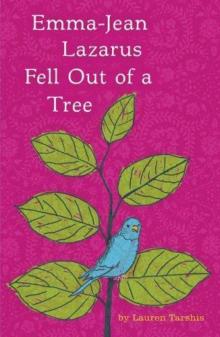 Emma-Jean Lazarus Fell Out of a Tree
Emma-Jean Lazarus Fell Out of a Tree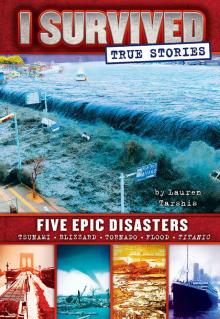 I Survived True Stories: Five Epic Disasters
I Survived True Stories: Five Epic Disasters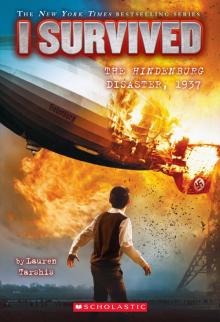 I Survived the Hindenburg Disaster, 1937
I Survived the Hindenburg Disaster, 1937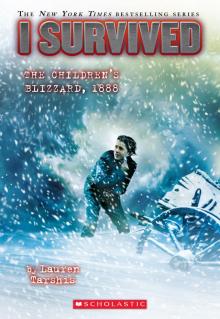 I Survived the Children's Blizzard, 1888
I Survived the Children's Blizzard, 1888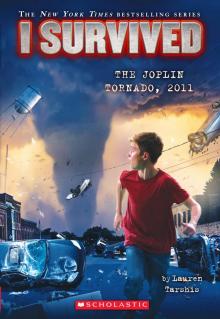 I Survived the Joplin Tornado, 2011
I Survived the Joplin Tornado, 2011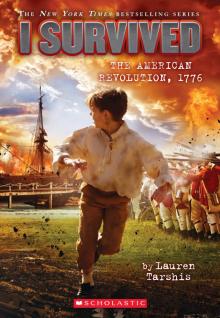 I Survived the American Revolution, 1776
I Survived the American Revolution, 1776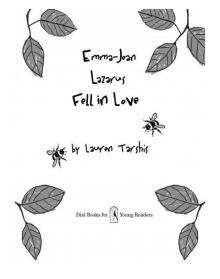 Emma Jean Lazarus Fell in Love
Emma Jean Lazarus Fell in Love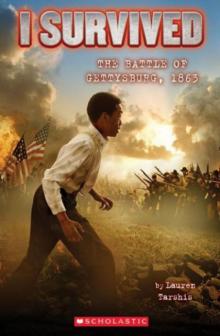 I Survived the Battle of Gettysburg, 1863
I Survived the Battle of Gettysburg, 1863 I Survived the Japanese Tsunami, 2011
I Survived the Japanese Tsunami, 2011